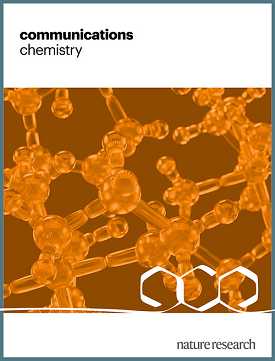Mechanistic investigation of sustainable heme-inspired biocatalytic synthesis of cyclopropanes for challenging substrates
IF 5.9
2区 化学
Q1 CHEMISTRY, MULTIDISCIPLINARY
引用次数: 0
Abstract
Engineered heme proteins exhibit excellent sustainable catalytic carbene transfer reactivities toward olefins for value-added cyclopropanes. However, unactivated and electron-deficient olefins remain challenging in such reactions. To help design efficient heme-inspired biocatalysts for these difficult situations, a systematic quantum chemical mechanistic study was performed to investigate effects of olefin substituents, non-native amino acid axial ligands, and natural and non-natural macrocycles with the widely used ethyl diazoacetate. Results show that electron-deficient substrate ethyl acrylate has a much higher barrier than the electron-rich styrene. For styrene, the predicted barrier trend is consistent with experimentally used heme analogue cofactors, which can significantly reduce barriers. For ethyl acrylate, while the best non-native axial ligand only marginally improves the reactivity versus the native histidine model, a couple of computationally studied macrocycles can dramatically reduce barriers to the level comparable to styrene. These results will facilitate the development of better biocatalysts in this area. Engineered heme proteins exhibit excellent sustainable catalytic carbene transfer reactivities enabling the transformation of olefins to cyclopropanes, however, exploiting unactivated and electron-deficient olefins in such reactions remains challenging. Here, the authors perform a quantum chemical mechanistic study to investigate the effects of olefin substituents, non-native amino acid axial ligands, and natural and non-natural macrocycles with the widely used ethyl diazoacetate, revealing the potential to design an efficient heme-inspired biocatalyst.

具有挑战性底物的血红素激发生物催化合成环丙烷的机理研究。
工程血红素蛋白对烯烃和增值环丙烷表现出优异的可持续催化羰基转移反应。然而,在这种反应中,未活化和缺电子的烯烃仍然具有挑战性。为了帮助设计高效的血红素类生物催化剂,我们进行了系统的量子化学机制研究,研究了烯烃取代基、非天然氨基酸轴向配体、天然和非天然大环与广泛使用的重氮乙酸乙酯的作用。结果表明,缺电子的底物丙烯酸乙酯具有比富电子的苯乙烯高得多的势垒。对于苯乙烯,预测的势垒趋势与实验中使用的血红素类似辅因子一致,可以显著降低势垒。对于丙烯酸乙酯,虽然最佳的非天然轴向配体与天然组氨酸模型相比仅略微提高了反应活性,但计算研究的几个大环可以显着降低屏障到与苯乙烯相当的水平。这些结果将促进该领域更好的生物催化剂的开发。
本文章由计算机程序翻译,如有差异,请以英文原文为准。
求助全文
约1分钟内获得全文
求助全文
来源期刊

Communications Chemistry
Chemistry-General Chemistry
CiteScore
7.70
自引率
1.70%
发文量
146
审稿时长
13 weeks
期刊介绍:
Communications Chemistry is an open access journal from Nature Research publishing high-quality research, reviews and commentary in all areas of the chemical sciences. Research papers published by the journal represent significant advances bringing new chemical insight to a specialized area of research. We also aim to provide a community forum for issues of importance to all chemists, regardless of sub-discipline.
 求助内容:
求助内容: 应助结果提醒方式:
应助结果提醒方式:


